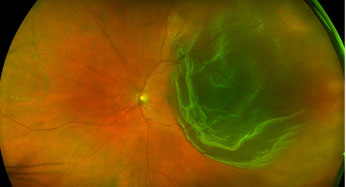Our retina specialists are board-certified ophthalmologists with advanced training in vitreoretinal surgery to diagnose and manage the full spectrum of diseases affecting the retina, macula, and vitreous.
Macular Pucker
What is Macular Pucker
A macular pucker, also referred to as an epiretinal membrane, involves the growth of a thin layer of scar tissue over your macula, a portion of your retina critical to your vision. The macula is involved with your central vision necessary for reading and seeing faces. Although a macular pucker involves the same portion of the retina as macular degeneration and macular holes, it is a distinct disease that is managed and treated differently.
Symptoms of Macular Pucker
Symptoms of a macular pucker can include blurred or distorted vision.
Causes of Macular Pucker
A macular pucker can have a number of causes but most often is caused by vitreous separation from the retina. This process is also associated with a number of other conditions, including macular holes and retinal tears. Vitreous separation can occur at any age, but is more common in those over the age of 60. This is part of the reason why it is recommended by the American Academy of Ophthalmology that all individuals over the age of 60 years have a yearly dilated eye exam.
In Macular pucker formation, as the vitreous gel separates from the retina, it stimulates cells to develop a scar formation response, which can cause traction or deformation of the retinal structure. These changes can be very subtle, having no impact on your vision, or can result in severe visual disturbance.
Treatment for Macular Pucker
Treatment of a macular pucker involves a vitrectomy surgery and is a decision that is made by you the patient, after careful discussion with your retina specialist.
What to Expect After Treatment
Most patients recover about half of their vision that has been lost by a macular pucker, although this can vary with some patients recovering 20/20 vision, and others having no improvement at all. It is not uncommon for you to have some residual distortion after surgery, although in most cases this significantly improves from the distortion experienced prior to surgery. Please discuss this diagnosis further with your eye doctor to determine the best treatment plan for you.
Online Resources
- Macular Pucker - The National Eye Institute
- What is a Macular Pucker? - American Academy of Ophthalmology



